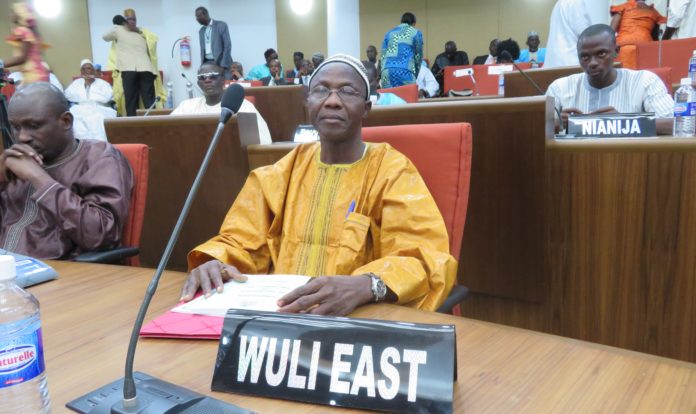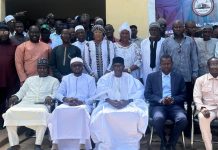Hon. Suwaibou Touray, member for Wuli East in his reaction to the Budget speech delivered by the Finance and Economic Affairs on Friday 6thDecember 2020, said research has shown that emerging and developing economy group is expected to grow at 4.1 percent in 2019, rising to 4.7 percent in 2020. But he said our own finance minister also said growth in Sub-Saharan Africa, the economy group The Gambia belongs to, is expected at 3.2 percent and 3.6 percent in 2020.
Hon. Touray then went on to state that the minister has also informed them in his statement on the Estimates of Revenues, Recurrent and Development Expenditures for Fiscal year 2020 that the Gambian economy is anticipated to grow by 4.0 percent in 2019 instead of 6.5 percent in 2018.
This means, he said, that the Gambian economy is slightly above average growth in the sub-Saharan region. He said the decline in growth is as a result of anticipated setbacks in agriculture and services.
‘’This also means that we as a country have a lot to think about agriculture and services if we really want to make a headway in our development process. Since the decline in growth is due mainly to low productivity in agriculture, it means we should as a matter of concern increase the budget for that sector to ensure that it performs to expectation”, said Hon. Touray.
Hon.Touray went further to observe on page 14 of the minister’s statement, that they are told that the AfCETA (Africa Continental Free Trade Area), which he opined has already come to effect after the Gambia has endorsed it. This Agreement, he said, requires that countries remove tariffs of 90% of the goods to allow free access to commodities, goods and services across the continent.
He opined that agricultural products and fish and fish products could have been Gambia’s comparative advantage, but said the country must be able to process them into finished products to be able to maximise gains in the AfCETA. ;that if The Gambia gives lip service to it, the country will lose the economy of scale, it will lose increased exports and lose the necessary foreign exchange.
He also reminded his colleagues that they are also informed in the budget speech in page 1 that tourism, governance, private sector, infrastructure and energy registers strongest progress, but said this did not surprise him at all since they all know the lip service they are giving to the most important productive sector of the economy, which in his view should have surpassed all the three sectors.
Referring to page 54, Touray said that the minister emphasised that priority has been on strengthening fiscal consolidation and restoring macroeconomic stability, but he said when it comes to achievements for the year under review, the minister said human capital and macro economy made only average progress.In fact, he said one of the most important areas, agriculture, fisheries and youth empowerment made only a limited progress.
Touray observed on page 7 of the speech, that all strategic significant constraints in achieving more progress on their outcomes, are due to financial constraints.
He then cited page 7 and said they are informed that only US$183 Million dollars or 10% percent of the pledges made in Brussels has been disbursed, but he was quick to say that maybe a good thing, ”that we have not taken all those loans because they may not have gone to uplift the productive base but rather into other areas”.
On the ECF or the Extended Credit Facility by the IMF which is described in the minister’s speech as ‘full blown, to be relied on to achieve macroeconomic stability’, Hon. Touray said in his view, ECF is extended to countries that have serious and long term balance of payment problems; that since the late 1980s, IMF has been providing ECF to the Gambia because it is meant simply to borrow money to be able to pay for imports. ‘Let me lend you so that you can buy my goods’. This is why it has a short grace period of 5 years and maturity of 10 years only.”
He expressed hope that this new facility will target poverty reduction and further proposed that the strategy to reduce poverty be shared with the august assembly.
The Wuli East lawmaker said if they had followed the strategy put before them by the then Finance minister in 2016 they would have graduated from the balance of payment crisis by now. But he said the problem has always been, what the government says on paper and what actually obtains during implementations of the budget are always different.
For example, in page 9, which he quoted: ‘’to achieve stability, the consolidation on the fiscal front will require bold reforms such as limiting Government borrowing, rationalising Government Agencies and Embassies, continuous Civil Service and Security Sector reforms and debt sustainability.”
But he said when you look at the budget one will see all the Embassies and Agencies are intact; they see more borrowing being planned and they see little progress on Civil Service and Security sector reforms and so on. He then asked when Gambia is going to take the bold move to do what it says it should do.
On the issue of the SOEs or state owned enterprises in page 9 and 46, Touray said they should be used to improve efficiency and to pay dividends to the government and that is the only way they can minimise fiscal stress for the state.
‘’My understanding for establishing SOEs is to create employment and provide public service and we thought they would do that when political influence is reduced and are free from government bureaucracy but I am told that that is not the case still now; Touray argued.
He however applauded the Minister on page 10 where the minister said something that he said has long been their cry in the august House and that is, the introduction of a single Treasury Account.
‘’Hon. Speaker, this is a laudable initiative that all serious governments must take and I do hope it is implemented sooner. Single Treasury Account will ensure all government revenues, receipts and income are collected into a single account and maintained by the Central Bank. Also all payments to be done in the same account,’’ said Hon. Touray.
‘’Let me also say that I am in spirit with the Finance minister with regards to the introduction of an electronic procurement system in all MDAs. Definitely, this will ensure transparency, reduced human interference and easier detection of irregularities and corruption in the public procurement process’’, he said.
Hon. Touray however said he is not in the same wavelength with the minister on Duty Exemption forms revision especially on the NGOs. The NGOs have bitterly complained about the Gross taxation on them which is hampering their operations and negatively affecting their target communities, he said; that the minister is now talking about increasing another tax on them from 1000-5000 dalasis. He then asked what happened to their recommendation regarding the review of gross taxation on NGOs.
On the Revenue Estimates, he said he is fine with the proposed environment tax on individuals as well as on used cars and opined that citizens should be responsible for the mess they inflict on their own environment, but emphasised that the tax paid should also be efficiently utilised for the purpose for which it is paid for.
Hon.Touray also speaking on the payment relating to ordinary number plates, he opined that the problem remains the same for many years. ‘’You would pay for number plates, but to get it becomes a big problem. Sometimes you just get frustrated and go and pay someone to make a number plate for you just so that you can be free from police harassment on the traffic. We need to look at that closely, ’he said.
Also on ID Cards, Touray is of the view that the income derived from ID cards could have surpassed the 11.5 million mentioned by the minister which he said is quite small considering the demand for this document and further said it could be maximised if they endeavour to reach out to communities in the rural areas; that coming from Sutukoba or Passamas to fetch ID card in Basse is making the whole process even more exorbitant.
In his conclusion, the Wuli East lawmaker finally said the Gambia’s debt ratio to GDP at 85.5 percent is unsustainable and may eventually be unmanageable and they must take all appropriate measures to ensure that debt levels are reduced. He opined that artificial measures such as debt relief and restructuring, etc. will not solve the crisis because they are meant to just push the problem to the future; that the whole burden of debt should not be pushed to the future generation only, but be equitably shared between us and them; that they too need to make sacrifices.




















